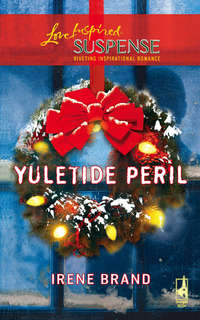
Полная версия
Heiress
“Will a half hour give you time to freshen up for dinner?” Charles asked, and when Allison nodded, he said, “Come into my room when you’re ready.”
Allison was ready in fifteen minutes, as was Charles, and as they waited for the elevator to take them to the restaurant, Allison said, “I’m not hungry.”
Charles gave her a hug. “I know that, but you’re going to eat anyway. Stop being nervous—this is going to work out fine.”
Tears welled in Allison’s eyes. “I hope so, but I’m scared.”
“I know that, too,” he said as he gently squeezed her shoulder.
Charles, who always had a healthy appetite, ordered a full meal, and when Allison asked for a salad only, Charles said to the waiter, “Add a bowl of vegetable soup and some crackers to her order. Also, we’ll have pie for dessert.”
He reached across the table and took Allison’s hand. “Listen to me, Allison. Harrison should not have loaded all this on you without telling you first, but that was his way. The man was self-centered, and while he seems to have had an excellent head for business, he didn’t know much about dealing with his family.”
“Why didn’t he ever come to see us?”
Charles shrugged and leaned back so the waitress could arrange their beverages and salads. He took Allison’s hand again as he said a prayer of thanks for their food.
“You know very well that I’ll miss you if you leave Chicago, but I honestly feel that your future lies here in Columbus.”
“I’ve been very unhappy for two years. I couldn’t live at the house anymore and see Donald bringing his wife home to visit. It helped to go into the apartment, but it will probably be better if I leave Chicago.”
Sternly, Charles said, “It’s time for you to stop this yearning for Donald. You would have had a miserable life married to a man who was in love with another woman.”
“I decided last week while you were gone that I was going to bury the past.”
“That’s good. When Donald refused to marry you, he was simply living by the Golden Rule, the way I’ve taught you children to live, and it’s time for you to forget him and go on with your life. Frankly, I question you ever had a deep love for Donald—he was just a habit in your life. You two were friends and little more, I think. He was your first boyfriend, Allison, but I don’t think you and Donald shared the strong feelings necessary for a good marriage.”
Allison stared at her father as if he didn’t know what he was talking about, but perhaps he was right. He hadn’t steered her wrong yet.
The next morning Charles ordered a taxi to take them to Curnutt’s office on South High Street.
“And they call Chicago the windy city,” Allison said to Charles as she noticed the effect of the strong wind sweeping across High Street where it intersected with Broad. People could hardly stand against its power. Stoplights and shop signs risked being blown from their moorings. Pigeons with ruffled feathers, strutting along the street looking for crumbs, staggered drunkenly from the force of the blasts, and passengers waiting at the bus stops were sprayed with liquid as foam coffee cups were torn from their hands.
“It’s a nice city, though,” Charles observed. “Smaller than Chicago, but enough like it that you wouldn’t notice a great deal of difference.”
Before they reached the stone statehouse in Capitol Square, they observed the sprawling Nationwide Insurance Plaza and passed under the connecting mall bridge between Lazarus and Jacobson’s, the city’s two large department stores. The stately city hall building was on their right as the taxi dodged in and out of traffic on busy High Street.
The attorney’s office was in a two-story brick building, which had been a dwelling at one time. Charles paid the taxi fare, took Allison’s arm, steered her along the sidewalk and up the two steps to the front door. She sighed deeply.
“You’re prettier when you smile,” Charles said jokingly, and Allison forced her features to relax. She couldn’t smile, but she did look pleasant as she inspected her image in the glass panel of the walnut door. A sign on the door said Open. Come in.
There was no turning back now. A blast of heat hit their faces, and it felt good after the chill morning air. They were in a narrow, heavily carpeted foyer with a circular stairway leading upward. The door to the left was marked Receptionist, and a woman well past her youth greeted them with a pleasant, “Good morning.” She was dressed in a black suit, and her elegance blended with the lavish office, which must have contained every modern office machine on the market. Thomas Curnutt obviously wasn’t a struggling young lawyer.
“I’m Charles Sayre, and this is my daughter Allison. We have an appointment with Mr. Curnutt.”
“Won’t you be seated for a few minutes? I’m Mary Curnutt, and my husband was delayed with a client at the hospital this morning, but he telephoned just a few moments ago that he would be here soon.”
Another delay, Allison thought with a sigh. If the Lord was trying to teach her patience, she was in the right classroom. Although it had been only eight days since she’d learned of her inheritance, the wait had seemed endless.
Alert to her moods, Charles muttered, “You’ve waited this long—five minutes more won’t make much difference.”
She flashed him a smile. How many times in her life had this best of all fathers jollied her out of the dismals?
The phone rang, and under cover of the secretary’s conversation, Charles said, “I can’t understand you. You’ve suddenly become a millionaire. That’s supposed to make you happy. You were excited at first. What’s happened?”
“I’m disturbed about Mother’s reaction. If she wanted me to have the money, I’d be dancing around light as a feather. I can’t be happy if I make others unhappy.”
Charles waved his arm in an impatient gesture. “Forget your mother. There comes a moment in all our lives when we can’t do what our parents want us to. Your mother will get over her peeve, but it will take time. Just be patient with her. And another thing, my only purpose here is to give you support. You’ll have to do the talking, so loosen up.”
When the secretary terminated her conversation, she said, “I believe I heard Mr. Curnutt come in.”
The door behind the secretary opened, and a well-built man of medium height entered the reception room. He had glossy dark hair, streaked with gray, and brown eyes, and Allison judged he was about sixty years old. He advanced and shook hands with Charles.
“I’m sorry to keep you waiting, Mr. Sayre,” Curnutt said in a deep-toned powerful voice, and he turned to Allison. “And this is Allison, I presume.”
Allison took his outstretched hand. He sounded as if meeting her was his greatest pleasure, and Curnutt’s presence affected her like a gentle breeze on a soft, spring day. She felt safe in his hands, and much of her nervousness dissipated under the influence of his warm, radiant personality as he stood aside to let Allison precede him into his office. The office had the air of a cozy living room, with comfortable leather chairs grouped about two coffee tables. The focal point of the room was a window overlooking the backyard, where cardinals and chickadees fought for sunflower seeds in a well-filled bird feeder. Tall maple trees marked the property line, and a fountain, now wrapped in a protective cover, would provide a pleasant addition to the scene in summer.
The attorney seated Allison and Charles beside one of the low tables, and Mrs. Curnutt brought in a silver tray containing coffee and tea urns and a plate of homemade cookies. Charles poured a cup of coffee and handed it to Allison, but she declined. She wouldn’t have considered putting food or drink into her queasy stomach.
While Curnutt opened a locked file and took out a well-filled folder, Allison clenched her fingers and commanded them not to tremble. God, I need some help, she prayed, and instantaneously she remembered a verse that she’d heard over and over at funerals. She almost felt as if this were her funeral—at least it was the death of her old way of life, so the words were welcome. “Do not let your hearts be troubled and do not be afraid.”
She felt Charles’s eyes upon her, and she was smiling when Curnutt sat down and laid the folder on the table between them.
“Mr. Curnutt,” Allison began in a steady voice, “the inheritance from my uncle came as a complete surprise to all of us. I know nothing about his affairs.”
He nodded. “I was aware that Harrison had not made his intentions known to you, and I advised him that he was making a mistake, and especially after he became ill, I insisted that you should be told, but he refused.”
“Then he wasn’t sick when he first made this will,” Allison said, taking the document from her purse.
“That’s correct. Harrison and I have been friends for years, and he had never mentioned a family until he came in here three years ago and asked me to draw up his will.”
“He must have been a strange man. He didn’t keep in contact with us, either.”
“He was a lonely man, I think, because he was attentive to his ailing wife. He worked hard at his company, but he had no social life.” Curnutt spread open the file. “Since I knew you were coming, I’ve prepared a portfolio of his worth so we could start probating the will upon your arrival.”
“Since I know nothing about his assets, tell me what I need to know.”
He smiled at her. “You should know, Miss Sayre, that you’ve become a very wealthy young woman. Page Publishing alone is worth more than a million, his three-story Victorian home could be listed for close to a million, and I estimate that his stocks, bonds and other assets will round out your total inheritance at nearly three million dollars.”
Sweat popped out on Allison’s hands, and she suddenly felt faint. Curnutt’s smiling face faded before her, and Charles placed a hand on her shoulder and shook her gently.
“I’m all right, but it’s overwhelming. You see, Mr. Curnutt, my mother wants me to sell the house and the publishing company and take cash for everything, and that’s a lot of cash! She doesn’t want me to move to Columbus, for she says I’m not mature enough to take over Uncle Harrison’s business, and I suspect she’s right.”
Curnutt shook his head and handed her a sheet of paper. “This is a copy of the codicil to your uncle’s will, and I neglected to give it to your parents last week. Perhaps Harrison had second thoughts about saddling you with so much responsibility, but a year ago, he made these provisions—you must manage Page Publishing Company for at least three years before you can sell it. And you will notice the stipulation that if you do not choose to abide by these provisions, you will not inherit, the business will be shut down and his assets will be liquidated and given to Mount Carmel Hospital.”
“So I take everything he had or nothing?”
“That’s right.”
Allison left the chair and walked toward the window. The cardinals flashed brilliant in the morning’s sun as they flew gracefully from the tall maples down to the feeder, grabbed a seed and winged back to their perch. Unlike birds in the wild, they had become dependent upon these handouts, and she wondered if she could accept Harrison’s money without becoming a slave to it. Unlike Tim, who was far too interested in material possessions, money had never been that important to Allison. Even when she considered leaving her present job, it wasn’t to earn more money—she simply wanted an opportunity to learn more and be more productive.
She sat down on the cushioned window seat and looked at Curnutt “Tell me something about Page Publishing Company.”
“Harrison started the business about thirty years ago. They specialize in printing curriculums for colleges and secondary schools. When Harrison started out, he did some trade publishing, but the business is really a printing company now, for they don’t deal with the authors personally. Rather, they do contract printing for a number of publishers. They produce books in Spanish, French and German, and they’re shipped all over the world. It’s a stable business.”
“What do you think I should do, Daddy?”
“The decision is yours, honey, but if you want some advice, I’d say go for it. You’ve had some experience with the publishing world. You’ll never know what you can do until you try. I’ve always heard, and I believe it, that when God closes one door of opportunity, He opens another. The Donald door is closed—you know that—so if God has provided a new pathway for you, be cautious about closing it before you step through. But,” he repeated, “the decision is yours.”
Allison stared at the floor and, with the toe of her shoe, traced the outline of the hexagon shapes on the carpet. Curnutt and Charles didn’t rush her.
“May I take some time to deliberate?”
“Certainly,” Curnutt said, “but I wouldn’t hesitate long. Will it help you make up your mind if I take you to Page Publishing and the house Harrison owned?”
“I’m not ready for that yet. I want to go back home and make my decision there. I’ll telephone you within a week.”
The attorney closed the file before him. “Very well.” He gave her a look of admiration. “May I say that it’s a privilege to work with such an exceptional young woman.”
Allison’s look of surprise was genuine. “Exceptional? Me? I’ve always considered myself a very ordinary person.”
“You aren’t, Miss Sayre. I don’t know of anyone—young or old—who would hesitate a minute if given an opportunity to have several million dollars handed to them. Let me repeat, you’re exceptional. I would be interested to know why you are so cautious.”
“I haven’t really thought it out, but I suppose I’m hesitating for a number of reasons. I’m afraid I will make a failure and lose everything. Also, I told you my mother doesn’t want me to move to Columbus, and I don’t want to be at odds with her. And what will so much wealth do to my values? My parents have taught me to avoid selfishness and greed, and I’ve had everything I want on a moderate income. Will I be greedy to take so much wealth? No doubt the hospital needs it more than L”
Curnutt smiled at her and shook his head. “As I said before, exceptional.”
Allison was silent as they traveled from Curnutt’s office to the airport, and Charles didn’t press her to talk. As the plane lifted into the air and she looked down on Columbus, now illuminated by the noonday sun, she said, “Daddy, I don’t think I can handle it.”
“I don’t care what you do, but you’re worrying needlessly about some things,” Charles said sternly. “I’ve told you that Beatrice will come around. She loves you. She won’t want to be estranged from you. And about running that business—millionaires don’t make all their own decisions—that’s why they employ accountants and lawyers. Besides, the employees at Page Publishing will do the work. Your job will be to see that they’re doing it right.”
Those words, meant for comfort, did little to assuage Allison’s apprehension. How could she supervise employees when she didn’t know what they were supposed to do?
Chapter Two
Still wavering between going to Columbus and rejecting the inheritance, Allison gave her employer two weeks’ notice and told her landlady that she would relinquish her furnished apartment in another month. More than once Allison picked up the receiver to telephone Thomas Curnutt to tell him that she wouldn’t accept the legacy and authorize him to transfer the assets to Mount Carmel Hospital, but something always held her back. Was it the unseen hand of God preventing her from making a mistake? At last, she telephoned Curnutt and told him that she would arrive in Columbus in late February, and he assured her that he would immediately set in motion the necessary steps to transfer Page’s assets to her.
Still plagued with misgivings, she began to pack her belongings. Allison wanted to move back home for the few weeks she had left, but when Beatrice still refused to discuss Allison’s plans for the future, she knew it wouldn’t be pleasant for any of them. Whether or not Charles intervened Allison didn’t know, but when Allison telephoned that she intended to move within a week, Beatrice did ask her to stay with them during her remaining days in Chicago.
Tim and Cleta came to help Allison pack the loaded boxes into her six-year-old sedan, and there wasn’t room for everything, but she gave a box of knickknacks to Cleta, enabling them to stow the remainder in the back seat and trunk.
As they shifted boxes to make more space, Tim said, “You won’t have to drive this old car much longer, Allison. What kind of new car will you buy?”
“I haven’t thought about a new car. I’ve been too busy burying the past to think about my future.”
“You’re afraid to think about it, aren’t you?” Cleta said.
Allison looked in amazement at her perceptive sister. “Maybe, but I have been busy.”
After Allison turned the key into her landlady, she said, “If we can all three wedge into the front seat, let’s drive around the city. Chicago has always been home; I rather hate to leave it.”
Along the lakefront, they enjoyed a view of the public parkland stretching along the shoreline, its broad beaches and lawns covered with a few inches of snow. They drove through downtown Chicago, with its spectacular skyscrapers, fashionable shops and many department stores. Entering the financial district, they noted at least six major banks, the Chicago Board of Trade, the City Hall-County Building and the blue-tinted Illinois Center. Only a few walkers braved the frigid weather to exercise in three-hundred-acre Grant Park. Allison had spent a lot of time with Donald in this downtown area, but she had also enjoyed days of pleasure with her family at the same places, so she focused on the family gatherings rather than her dates with Donald.
As the time approached for her departure, Allison felt her excitement intensify, yet she would have anticipated the adventure much more if her mother had not been displeased. Allison had deduced that Beatrice was not angry with her, for she prepared all the foods that her daughter preferred and insisted that Allison store anything in her bedroom that she didn’t want to move to Columbus, and she arranged a dinner party for the family and Allison’s best friends at a downtown restaurant and bought tickets to a performance of the Chicago Symphony. Allison winced at the cost of the evening, but she had to accept the outlay of money—for she knew it was Beatrice’s way of apologizing for her attitude. Allison decided that her mother was reconciled to the move, for she made no overt display of unhappiness, although Tim and Cleta shed tears for a couple of days before her departure, and Charles, his face solemn, would often hug Allison tightly without saying a word.
Although eager to be on her way, Allison dreaded their final parting, but she forced a cheerful attitude until, at the last minute, Beatrice embraced her eldest daughter and wept convulsively. Her grief spread until the whole family was sobbing, and when Allison finally drove away from the house, her eyes were swollen and red. Beatrice had gone into the house rather than watch Allison leave. She realized that her mother would miss her, but Allison still felt puzzled at her mother’s reaction. It wasn’t as if Columbus were a continent away—there was no reason they couldn’t visit often. Children couldn’t stay in the family home forever, and it wasn’t like Beatrice to act this way.
Allison planned two days for the trip to Columbus, but driving conditions were favorable and she arrived at the luxurious hotel along High Street where Thomas Curnutt had made reservations for her early Thursday afternoon. Over the past month, she had often wondered if this change in her circumstances was real or if she was dreaming, but if she needed proof that she was now classed among the wealthy, it came when she reached the hotel complex and a valet took her old car and parked it beside the Cadillacs, Lincolns and Mercedes belonging to the hotel’s other patrons.
As she followed another valet carrying her small bags into the reception room, Allison had never felt more out of place. Recalling a poem that Charles, from his childhood memory, had often quoted, she thought, “Lawk a mercy on me, this is none of I.”
Dressed in jeans, wearing a heavy parka and fur-lined boots, she certainly looked out of place, and she breathed a sigh of relief when the door of her room closed behind her. Even here she felt overwhelmed as she viewed the large room with king-sized bed, lavish draperies and bedspread, thick carpet and modish furniture. How she wished she were still in Chicago!
After she telephoned her mother that she had made the journey safely, Allison contacted the attorney’s office and made an appointment for the next morning. Still, she had several hours on her hands before bedtime. She wouldn’t consider going to a dining room in this building for dinner, especially when the few dress garments she owned were packed away in the car. She contemplated room service for her meal, but she couldn’t cower in the room for hours. So exhibiting a nonchalance she didn’t feel, Allison took the elevator to the lobby, happily noting that many people were dressed in casual attire, and went out to take a look around the shopping district.
Trying to envision what the city would be like in spring and summer, Allison snuggled into the warm parka, tucked gloved fingers into her pockets and merged with the natives. After she reached Capitol Square, she slowed down and looked in the shop windows, wondering if she should buy some new clothes. She wouldn’t spend an inheritance she hadn’t received, but she did have some Christmas gift money that she had been carrying in her billfold for weeks.
In a large department store, Allison tried on several dresses before choosing a two-piece brick matte jersey skirt and a matching tunic with vee-necked top. She also decided on a tailored navy suit with a long, fitted jacket and straight-cut skirt Though the style was a bit more severe than her usual taste, she thought it looked businesslike and made her appear older. Taking over Page Publishing, she’d need all the help she could get.
Leaving the clothing department, Allison stopped to look for a new nail color, for she wanted to work on her nails tonight. Packing and the rush of moving had been hard on her hands. She had spent all her gift money, so she didn’t buy anything new, deciding instead to use what she had in her cosmetic bag at the hotel.
The shopping had consumed Allison’s extra time and dusk was falling when she left the department store. She stopped for a meal at a nearby Chinese restaurant, and it was completely dark by the time she finished eating. The air was considerably colder, so Allison hailed a taxi to take her back to the hotel.
Dressed in her new blue suit, Allison didn’t hesitate about breakfasting in the luxurious hotel, and she asked the concierge to order a taxi for her at nine o’clock. She would leave her car parked at the hotel until she could make other living arrangements. After seeing the cost of the room for one night, Allison knew that her bank account wasn’t adequate to spend many nights here, and she figured it would be a long time before she had any access to funds from her inheritance.
The fast-driving taxi driver arrived at Curnutt’s office before she had her mind composed to talk to the attorney. One minute Allison was excited and optimistic about the adventure she was facing, and other times she was clammy with fear and indecision.
The latter emotion predominated when she cautiously entered the lawyer’s office. She thawed somewhat under Mary Curnutt’s welcome and the attorney’s outstretched hand, but when she sat facing him and Curnutt started discussing the legal ramifications of her inheritance, Allison swallowed hard and said, “You can’t imagine how inadequate I feel to be taking over this estate. You’re wasting your time explaining all those things to me. I don’t understand much of what you’re saying. Can’t you just take care of what has to be done?”








